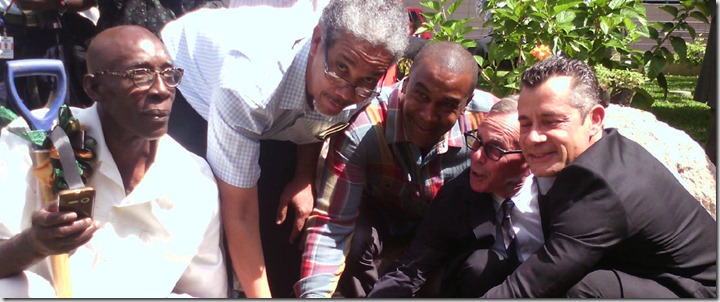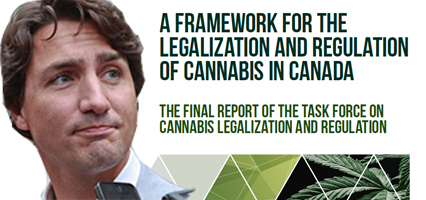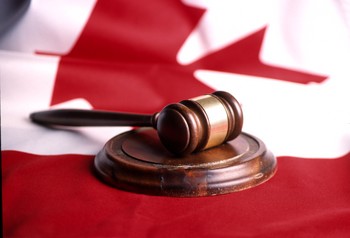A Retrospective Look at the Future of Canadian Drug Policy
By Ryan Fink
The past decade has seen much progress in what is fast becoming a revolution surrounding government drug policy and social attitudes toward drug culture in Canada. The endurance and proliferation across the country of illegal medicinal cannabis providers over the past decade, alongside the blossoming of the medical pot industry in many states south of the border, has been a testament to both the resilience of the anti-prohibition movement and the moral integrity of its objective. Despite numerous police raids, all followed by long and expensive court proceedings, the fight against prohibition has continuously gained strength—and more importantly, public support—all in the face of being left unprotected by broken laws.
In previous Cannabis Digest articles, Ted Smith has been documenting the progression of Owen Smith’s (no relation) recent encounter with the Supreme Court of B.C. Now that Owen has effectively changed federal law, it seems like a good time to take a step back and look at our most recent case in light of the CBC of C’s past encounters with the police and courts, as well as to look at where things might be headed, and to let you know about how you can help in this ongoing process of changing regulations and public attitudes.
To help in understanding my personal perspective on this transition, (and because this is the first time I’ve written for the Digest), I’ll introduce myself: my name is Ryan Fink. My recent addition to the newspaper crew has been a kind of return. After spending nearly 10 years wandering stoned through the halls of various academic institutions, I have been glad these past few months to have been re-immersed in the world of Hempology. The timing of my return was coincidental: it was a trial, or rather waiting for one, that saw me leave Hempology and the CBC of C in the fall of 2003, and I returned the day before BC Supreme Court Justice Johnston released his decision regarding the unconstitutionality of the MMAR’s restrictions on processed cannabis derivatives in my colleague Owen Smith’s voir dire.
I don’t have to tell anyone who has been following events for the past decade, but things have changed since my departure. One day soon someone will write a thick book going into the details of this radical transformation; but for now, having myself only begun to understand how things have changed and continue to change, I’ll keep my analysis simple: the situation has gotten immensely better. Moreover, Justice Johnston’s recent decision continues this trend, a trend that seems to be driven largely by a combination of the perseverance of people who are willing to fight for the right to self-medicate, and who are now cheek-by-jowl with an increasing number of judges and other powerful persons who are themselves now willing to fight the questionable illusions tossed hastily about by conservative politicians and the corporate lobbyists who bankroll them.
The greatest difference between then and now seems to be summed most easily for me by comparing the outcomes of this latest court case with the outcomes of those court cases of a decade ago. Back in the early millennium, the court case was secondary to the raid that preceded it. Ten years ago a raid would cost the club many thousands of dollars in immediate losses, and would result in lost business while members overcame their fear that the police would return any day to close the doors finally.
Then the court case was a mere formality following the costly raid, a simple engagement of massive public resources for the purpose of having a judge tell us that we weren’t doing anything wrong, and that the police were wrong to rob us (however impossible it was for them to repay us, or be brought to justice themselves for what, from our perspective, amounted to nothing more than robbery and harassment). Nowadays the raids are accidental, the court cases monumental.
When I was arrested back in 2003, it was by a team of police officers who were bent on dismantling the CBC of C through continued raids, who would go to questionable lengths to obtain warrants, realizing all the while that, in legal terms, their efforts would be fruitless. However, when Owen was arrested in Dec. of 2009, it was entirely circumstantial. The bakery was in a residential high-rise.
One day, a neighbor down the hall was making an isopropyl extraction of THC from cannabis in their own apartment (something the CBC of C has no part in as a rule), and another neighbor assumed that the smell was coming from our bakery, and so summoned the police. Being required to investigate the complaint, the officers’ professional responsibilities left them no choice but to treat the bakery the same as they might any clandestine drug lab, despite any reason or conscience.
Where in 2003 I took it upon myself to give the officers who raided the Club a heated lecture on the amorality of their actions, morality didn’t enter the equation in 2010: it was a simple matter of coincidence and protocol, and of Owen’s being left unprotected by antiquated laws that were unjust from their inception, and that now cause even more harm than they did when they were first passed in the early 20th century to benefit none save the wealthy industrialists who first lobbied for their creation, and who continue to lobby for their permanence.
While cannabis is still illegal for most—as it is still dangerous to the interests of wealthy industrialists—there is a growing concern among intelligent, socially conscious individuals from all walks of life, including doctors, judges, politicians, and police officers, who have seen the harm that is needlessly caused by prohibition laws and want to do something about it.
Throughout Owen’s recent voir dire, Justice Johnston clearly implied, by referring to previous decisions as “ducking” the issue, that he was tired of the buck being passed between various courts and offices regarding the many flaws that still need to be worked out of the MMAR (if it is not to be stricken completely and replaced with something more practical and less politically biased).
The social context that allows Justice Johnston to make common-sense statements and decisions in the face of a government that would have him ignore reason is twofold: firstly, there are the many court cases that have taken place arguing the inefficacy and unconstitutionality of the MMAR since it was carelessly introduced in the summer of 2001; and secondly there is the proliferance of casual or even positive attitudes toward cannabis in contemporary popular media.
Think of shows such as Weeds, Trailer Park Boys, Mad Men,That 70’s Show—many of the most popular television shows of the past decade have either centered around cannabis use, or featured it in special episodes, such as an episode of The Simpsons in which Homer obtains a medical exemption (guest starring Tommy Chong). While such media have no direct effect on the legal proceedings that shape prohibition laws, their influence diffuses through the social consciousness, affecting the way we as a public react to drug culture, familiarizing us with it, and engendering a social environment in which eminent figures such as judges and doctors can speak the truth about cannabis without fear of losing the right to practice their distinguished professions.
And so where Justice Johnston was able to contribute to what will, we hope, culminate in a scrapping of the MMAR in its entirety, the judge who presided over my case a decade ago had to simply make due with putting an end to the trial before it began when he declared that, despite many obvious indications to the contrary, the police had failed to prove that I was in care and control of the medicine they had seized in what turned out to be the last ever premeditated police raid on the CBC of C, in 2003.
What I see forming through these trials and tribulations is a kind of symbiosis between the courts and various activist groups, mediated by the now random and circumstantial police interventions that result from nothing more than broken laws. These broken laws force encounters between us and an overburdened judicial system.
Despite the unfortunate albatross that these trials tie about the court’s neck, history has shown that in continuing to endure these processes, we not only have an opportunity to make our voice heard to those with the power to enforce change, but also an opportunity to learn directly from these people how we can continue to change our own practices and policies in order to together create a model that balances the bureaucracy’s need for institutional homogeneity with the many and diverse needs and circumstances of our membership. In this sense, all of the legal proceedings that have happened since the implementation of the MMAR surrounding the medicinal use of cannabis have, in fact, made up a sort of incredibly expensive and inefficient interim solution to the plethora of problems created initially by the MMAR.
Though this relationship might seem less than ideal, it is the best tool we have at the moment for continuing to create positive change in the MMAR and the anti-prohibition movement in general. Owen’s success in his challenge to the Supreme Court was a great one, but the possession and trafficking charges pressed upon him still stand. This trial will begin on Feb. 4, 2013, and will be held in front of a jury. Our main goal will be to convince this jury that by providing our membership with a wide assortment of edible and topical products, the CBC of C is providing an invaluable service for people who need it and would otherwise be unable to get it.
Consider the amount of knowledge and work that goes into producing so many different forms of medicine that suit so many discreet needs, from cookies to pills, and massage oil to muscle balm. And then consider that all but a couple of these products are made with cannabis that is donated by considerate individuals, and that despite this massive saving, we still sell most of this medicine at a net loss, supplementing its cost with proceeds from the sale of dry smoke; therefore, we provide these products at a cost so low that to make them for one’s self (if one is able) would represent a significant increase in personal expense.
With this in mind, I implore any members of the CBC of C who are reading this, and who feel that any of our topical or edible products have benefited their lives in a way that would otherwise not have been possible, to come forward and let us know that you would like to testify on behalf of Owen and the club next Feb., to help us show the jury and anyone else who needs convincing that Owen was providing an invaluable service to the community at the time that he was arrested. We need about 20 people, so if you are a member of the CBC of C and this sounds like something you’d like to do, please contact us at your earliest convenience.
However much ground has been broken in this ongoing fight, the law is still broken, and so there will doubtlessly be more senseless confrontations between a frustrated court system and a legalization movement that, though it is stronger now than ever, continues to grow with increasing momentum, and continues to gain influence and change society in ways that seemed impossible 10 years ago.
And so, with the support of the media, the courts, many politicians, and the majority of the public, Owen will go back to court next year to beat charges of breaking a broken law that has since been declared unconstitutional. Let this “trial by fire” continue, and let it burn away at the farcical restrictions imposed by the MMAR, leaving behind what will fundamentally amount to a restoration of the basic right of all living beings to eat, smoke, and drink as they like.




